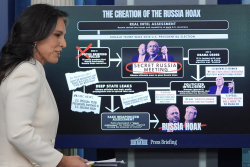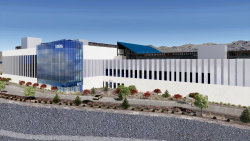In alignment with President Trump’s goals for US policy in the Levant, Barrack’s efforts have shown that diplomacy can be unorthodox yet effective.
It is not often that the United States gets a chance to right its wrongs in the Middle East. Following the failure of the Obama administration’s Syria policy, the fallout of that failure during the first Trump administration, and the indifference of the Biden administration, the abrupt fall of the brutal Assad regime amid the post-October 7 regional upheaval has presented a new opportunity in the Levant.
Enter Tom Barrack.
A real estate investor and businessman with decades of dealmaking in the Gulf, Ambassador Barrack has earned a rare level of trust among regional elites. He is also a close confidant of President Donald Trump, with a personal relationship that spans decades. That long-standing bond, combined with his deep regional ties, has given him a level of credibility few American envoys have been able to bring to their diplomatic tenures in the Levant.
Trump chose someone to implement US policy in the Levant that understands the rules of the game—a fluent operator in a region that values personal relationships over rhetoric and policy papers. Barrack’s mandate is clear, and builds on Trump’s remarks in Riyadh, Saudi Arabia. The United States is not getting involved to remake Syria or Lebanon in America’s image—the quixotic “nation-building” quest that sank America’s war in Iraq—but rather to prevent the power vacuum from being filled by Washington’s enemies by keeping the doors open and working to prioritize commerce over chaos. Barrack’s style mirrors President Trump’s shift toward practical, results-driven diplomacy, a sharp break from the orthodoxy that long defined US engagement in the Levant.
Since becoming the US Special Envoy to Syria—a duty he is tackling in addition to his existing role as ambassador to Turkey—Barrack has helped create an unprecedented level of understanding and trust between Washington and Damascus. It helps that he is not lecturing Damascus, as American diplomats have been known to do in the past, but rather nudging and helping guide a nascent Syrian government towards a path of potential. As Special Envoy, Barrack has met with the key actors, both internal and external, that have a stake in Syria’s future. Following the outbreak of violence this month between armed Druze factions, Bedouin tribes, and armed groups that took advantage of the unrest in southern Syria and unleashed horrific violence on its people, he was instrumental in securing a ceasefire and ensuring its swift implementation. In an era where fragile states like Syria are often judged against utopian standards, Barrack seems to recognize that Syria lacks an institutional history of stable governance—and that working with a fledgling state still extinguishing decades-old fires will require time and patience. Amidst a regional inflection point that calls for subtlety and honesty, he is playing his cards right.
Barrack’s tenure so far has a bit of a “shock and awe” feel to it, and the region’s residents and policymakers seem to hang on his every word. When the ambassador lamented the 1916 Sykes-Picot agreement as a generational mistake, people were startled by his candor. To have an envoy of the United States speak so bluntly about the fallout of Western meddling in the Middle East was unprecedented, and resonated with those who have lived its legacy in the modern era. Barrack’s candid warning that Lebanon risked being left behind unless it addressed Hezbollah, its longstanding elephant in the room—and his stark reminder of the country’s existential geographic disadvantages—hit hard. Coming on the heels of remarks from the previous envoy Morgan Ortagus saying that Lebanon could learn from Syria, the message jolted the Lebanese to attention. After years of fruitless carrot-dangling, nothing spurs Lebanon’s leaders like a hint at the Syria stick.
More importantly, the public vote of confidence that Barrack has received from Trump and Secretary of State Marco Rubio has allowed the region’s actors to know he is directly speaking on their behalf and articulating US policy. One of the most important positions he has laid out is Washington’s rejection of a federal model for Syria. This position should be a wake-up call to Syria’s President Ahmed Al Sharaa to establish a more inclusive governance regimen—one that takes into account Syrian pluralism and allows all its groups to advocate for their interests peacefully from within. The ambassador stressed as much following the Suweida crisis, noting the importance of putting more seats on the table to avoid geographical and societal fragmentation.
Barrack’s approach is not without risk. Critics have argued that his outside-the-box thinking and statements jeopardize certain US positions and give ammunition to America’s adversaries. His candid remarks on Lebanon and its relationship with Syria were cited by Hezbollah’s new secretary general as an excuse to cling to its weapons, and there is some evidence that his comments on Lebanon have increased Lebanese political infighting rather than curtailing it. Personal diplomacy depends on personalities, not institutions, and creating person-to-person relationships in a region as volatile as the Levant is a gamble. For now, though, it is mostly delivering.
Only last week, Barrack convened historic face-to-face talks in Paris between Syrian Foreign Minister Asaad Al-Shaibani and Israel’s Minister for Strategic Affairs Ron Dermer. These were the first direct talks between Israel and Syria since former US President Bill Clinton convened talks in 2000 between Israeli Prime Minister Ehud Barak and Syrian Foreign Minister Farouk al-Sharaa. This dialogue is vital given the recent escalation by Israel towards its northern neighbor, and comes at a moment where misunderstandings between the two sides can have fatal consequences. These consultations, which aim to lead to a return to a new, updated agreement on the 1974 ceasefire lines between Israel and Syria, are an important step in building trust between both sides and necessary before any serious movement towards Syria joining the Abraham Accords.
In alignment with President Trump’s goals for US policy in the Levant, Barrack’s efforts have shown that diplomacy can be unorthodox yet effective. This may be exactly what the Levant needs right now, after years of being a playground of ineffective US policymakers. The United States seems serious in its push for regional stabilization—a natural extension of its core mission of defeating the remnants of ISIS and preventing Iranian entrenchment. If Washington wants to reclaim its relevance in the Levant, it would do well to follow Barrack’s lead: speak less, listen more, and show up when needed. More challenges await the ambassador’s tenure, particularly amidst a need for more diplomatic efforts to bring the Syrian Democratic Forces (SDF) into Damascus’s fold, per the March 10 agreement between the Sharaa government and SDF de facto leader Mazloum Abdi. It is far too early to declare success, but if Barrack’s style holds and produces results, it may well mark the beginning of a more honest and enduring chapter for American diplomacy in the region.
About the Author: Ameer Alsamman
Ameer Alsamman is a foreign policy professional based in Washington, DC, and the founder of SyriaSpeaks, an initiative focused on advancing political awareness and civic engagement among Syrians through the lens of transitional justice in a post-Assad future. His professional experience spans both public and private sectors across the United States, United Kingdom, United Arab Emirates, Syria, and Lebanon. Ameer holds a master’s degree in International Law from SOAS, University of London, and a bachelor’s degree in International Affairs and Political Science from the Lebanese American University. You can find him on Twitter/X at @Ameerovve.
Image: Wikimedia Commons.

















